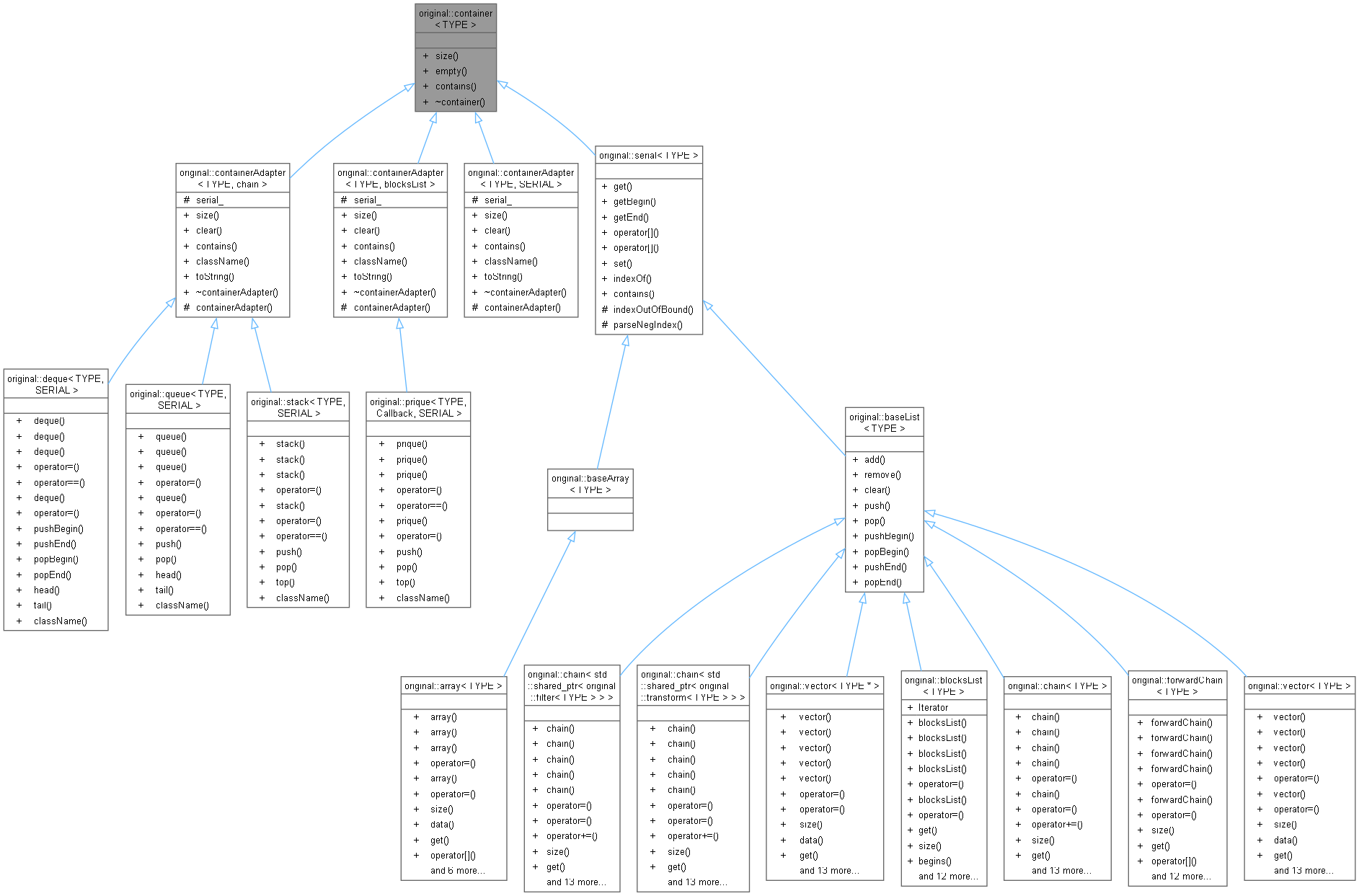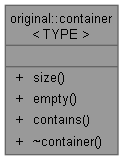Abstract base class for containers. More...
#include <container.h>


Public Member Functions | |
| virtual u_integer | size () const =0 |
| Gets the number of elements in the container. | |
| bool | empty () const |
| Checks if the container is empty. | |
| virtual bool | contains (const TYPE &e) const =0 |
| Checks if an element is contained in the container. | |
| virtual | ~container ()=default |
| Destructor for the container class. | |
Protected Member Functions | |
| container (ALLOC alloc=ALLOC{}) | |
| Constructs a container with specified allocator. | |
| TYPE * | allocate (u_integer size) |
| Allocates raw memory for elements. | |
| void | deallocate (TYPE *ptr, u_integer size) |
| Deallocates memory previously allocated by allocate() | |
| template<typename O_TYPE, typename... Args> | |
| void | construct (O_TYPE *o_ptr, Args &&... args) |
| Constructs an element in-place. | |
| template<typename O_TYPE> | |
| void | destroy (O_TYPE *o_ptr) |
| Destroys an element. | |
Protected Attributes | |
| ALLOC | allocator |
| The allocator instance used for memory management. | |
Detailed Description
class original::container< TYPE, ALLOC >
Abstract base class for containers.
- Template Parameters
-
TYPE Type of the elements stored in the container. ALLOC Allocator type for memory management (default is allocator<TYPE>)
Provides a common interface for container classes to manage a collection of elements. Supports querying the size, checking for emptiness, and checking if an element is contained. Uses the provided allocator for all memory management operations.
Constructor & Destructor Documentation
◆ container()
|
explicitprotected |
Constructs a container with specified allocator.
- Parameters
-
alloc Allocator instance to use for memory management (has default-constructed ALLOC)
Initializes the container with the given allocator. The allocator will be used for all memory operations performed by the container.
◆ ~container()
|
virtualdefault |
Destructor for the container class.
Ensures proper cleanup of resources if necessary.
Member Function Documentation
◆ allocate()
|
protected |
Allocates raw memory for elements.
- Parameters
-
size Number of elements to allocate memory for
- Returns
- Pointer to the allocated memory
- Note
- The memory is allocated but elements are not constructed
◆ construct()
|
protected |
Constructs an element in-place.
- Template Parameters
-
O_TYPE Type of object to construct (must be compatible with TYPE) Args Types of constructor arguments
- Parameters
-
o_ptr Pointer to the memory where the object should be constructed args Arguments to forward to the constructor
Uses the container's allocator to construct an object of type O_TYPE
◆ contains()
|
pure virtual |
Checks if an element is contained in the container.
- Parameters
-
e Element to check for presence in the container.
- Returns
- True if the element is found in the container, false otherwise.
This method must be implemented by derived classes to provide the actual containment check.
Implemented in original::containerAdapter< TYPE, SERIAL, ALLOC >, original::containerAdapter< TYPE, blocksList, allocator >, original::containerAdapter< TYPE, chain, allocator >, original::serial< TYPE, ALLOC >, original::serial< bool, allocator< bool > >, original::serial< opts, allocator< opts > >, original::serial< original::hashTable::hashNode *, rebind_alloc_pointer >, original::serial< original::skipList::skipListNode *, allocator< original::skipList::skipListNode * > >, original::serial< TYPE, allocator< TYPE > >, and original::serial< underlying_type, rebind_alloc_underlying >.
◆ deallocate()
|
protected |
Deallocates memory previously allocated by allocate()
- Parameters
-
ptr Pointer to the memory to deallocate size Number of elements the memory was allocated for
- Note
- Elements must be destroyed before de-allocation
◆ destroy()
|
protected |
Destroys an element.
- Template Parameters
-
O_TYPE Type of object to destroy (must be compatible with TYPE)
- Parameters
-
o_ptr Pointer to the object to destroy
Uses the container's allocator to properly destroy the object
◆ empty()
|
nodiscard |
◆ size()
|
nodiscardpure virtual |
Gets the number of elements in the container.
- Returns
- The size of the container.
This method must be implemented by derived classes to return the correct size.
Implemented in original::array< TYPE, ALLOC >, original::array< underlying_type, rebind_alloc_underlying >, original::bitSet< ALLOC >, original::blocksList< TYPE, ALLOC >, original::blocksList< TYPE, allocator< TYPE > >, original::chain< TYPE, ALLOC >, original::chain< opts >, original::chain< original::strongPtr< original::filter< TYPE > > >, original::chain< original::strongPtr< original::transform< TYPE > > >, original::chain< TYPE, allocator< TYPE > >, original::containerAdapter< TYPE, SERIAL, ALLOC >, original::containerAdapter< TYPE, blocksList, allocator >, original::containerAdapter< TYPE, chain, allocator >, original::forwardChain< TYPE, ALLOC >, original::vector< TYPE, ALLOC >, original::vector< hashNode *, rebind_alloc_pointer >, original::vector< hashNode *, rebind_alloc_pointer >, original::vector< original::hashTable::hashNode *, rebind_alloc_pointer >, original::vector< original::skipList::skipListNode * >, and original::vector< TYPE * >.
Member Data Documentation
◆ allocator
|
protected |
The allocator instance used for memory management.
Used by derived classes to allocate/deallocate memory and construct/destroy elements
The documentation for this class was generated from the following file:
- src/core/container.h
Generated by